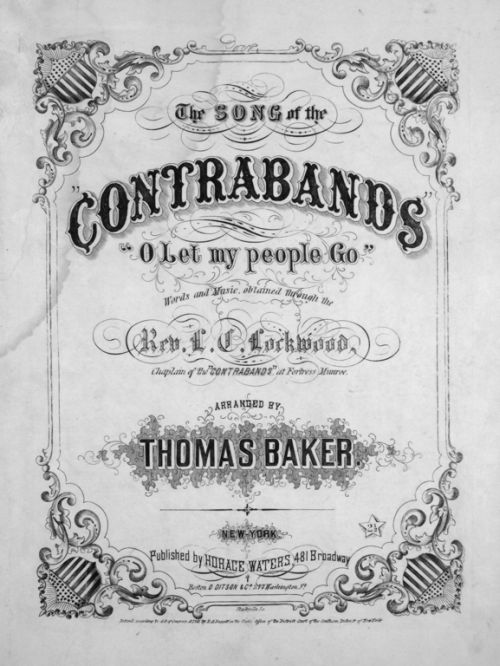- Go Down Moses
Infobox Standard
title="Go Down, Moses"
comment=
image_size=
caption=Songbook page of "Go Down, Moses", 1873
writer=
composer=Traditional
lyricist=
published=
written=
form=Negro spiritual
original_artist=Fisk Jubilee Singers
"(Earliest attested)"
recorded_by=
performed_by="Go Down Moses" is an AmericanNegro spiritual . It describes events in theOld Testament of theBible , specificallyExodus 5:1: "And the Lord spoke unto Moses, go unto Pharaoh, and say unto him, thus saith the Lord, Let my people go, that they may serve me", in which God commandsMoses to demand the release of theIsraelites from bondage inEgypt . The opening verse as published by the Jubilee Singers in 1872::" When Israel was in Egypt's land: Let my people go,":"Oppress'd so hard they could not stand, Let my People go."::"Go down, Moses,"::"Way down in Egypt land,"::"Tell ole Pharoh,"::"Let my people go.""Oh! Let My People Go"
Infobox Standard
title="Oh! Let My People Go
comment="(The Song of the Contrabands)"
image_size=
caption=Cover of sheet music, 1862
writer=
composer=Traditional
lyricist=
published=1862
written=
form=Negro spiritual
original_artist=Contrabands
recorded_by=
performed_by=Although usually thought of as a spiritual, the earliest recorded use of the song was as a rallying anthem for the Contrabands atFort Monroe sometime before July 1862. Early authorities presumed it was composed by them. ["The Continental Monthly", Vol II, pp. 114-113, "We are indebted to Clark's "School-Visitor" for the following song of the Contrabands, which originated among the latter, and was first sung by them in the hearing of white people at Fortress Monroe, where it was noted down by their chaplain, Rev. L.C. Lockwood."] Sheet music was soon after published, titled "Oh! Let My People Go: The Song of the Contrabands" and arranged by Horace Waters. L.C. Lockwood, chaplain of the Contrabands, stated in the sheet music the song was from Virginia, dating from about 1853. [Lockwood, "Oh! Let My People Go", p. 5: "This Song has been sung for about nine years by the Slaves of Virginia."] The opening verse, as recorded by the Lockwood, is::"The Lord, by Moses, to Pharaoh said: Oh! let my people go.":"If not, I'll smite your first-born dead—Oh! let my people go."::"Oh! go down, Moses,"::"Away down to Egypt's land,"::"And tell King Pharaoh"::"To let my people go."Incidentals
The song was made famous by
Paul Robeson whose voice, deep and resonant as it was, was said by some to have attained the status of the voice of God. On February 7, 1958, the song was recorded in New York City, and sung byLouis Armstrong with Sy Oliver's Orchestra.It is also one of the spirituals used in the
oratorio "A Child of Our Time " by the English composerMichael Tippett .William Faulkner titled his novel "Go Down, Moses " after the song.A Hebrew translation of the song is a common element in the
Passover seder in Israel.References
Bibliography
*"The Continental Monthly". Vol. II (July-December, 1862). New York.
*Lockwood, L.C. "Oh! Let My People Go: The Song of the Contrabands". New York: Horace Waters (1862).External links
* [http://ctl.du.edu/spirituals/ Sweet Chariot: The Story of the Spirituals] , particularly their [http://ctl.du.edu/spirituals/Freedom/source.cfm section on "Freedom"] (Web site maintained by [http://spiritualsproject.org/ The Spirituals Project] at the University of Denver)
*
Wikimedia Foundation. 2010.
